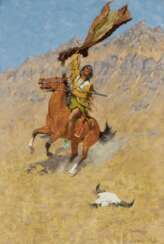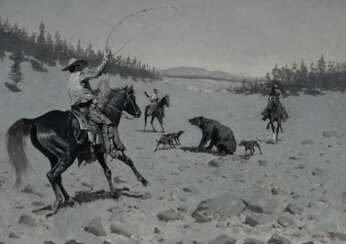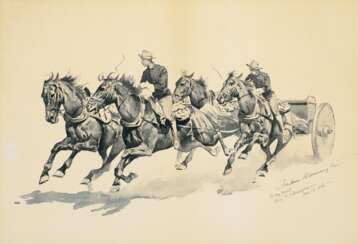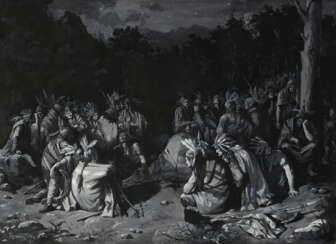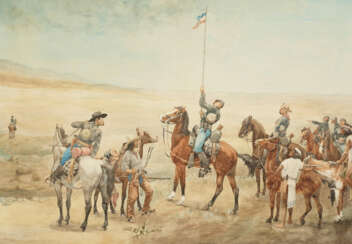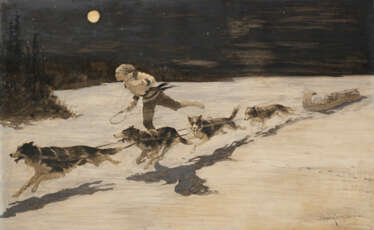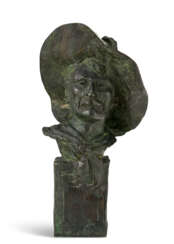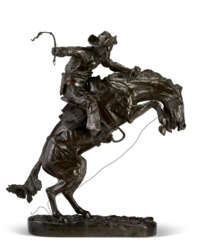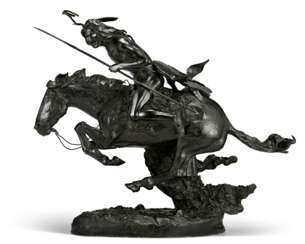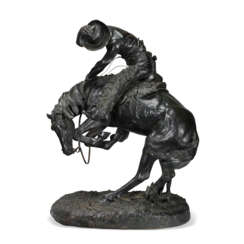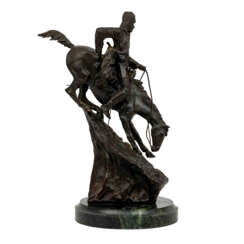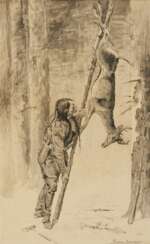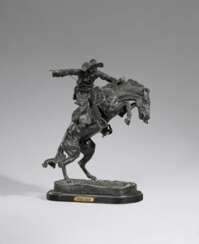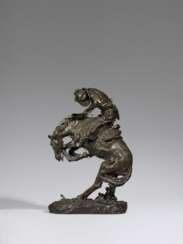фредерик ремингтон (1861 - 1909)
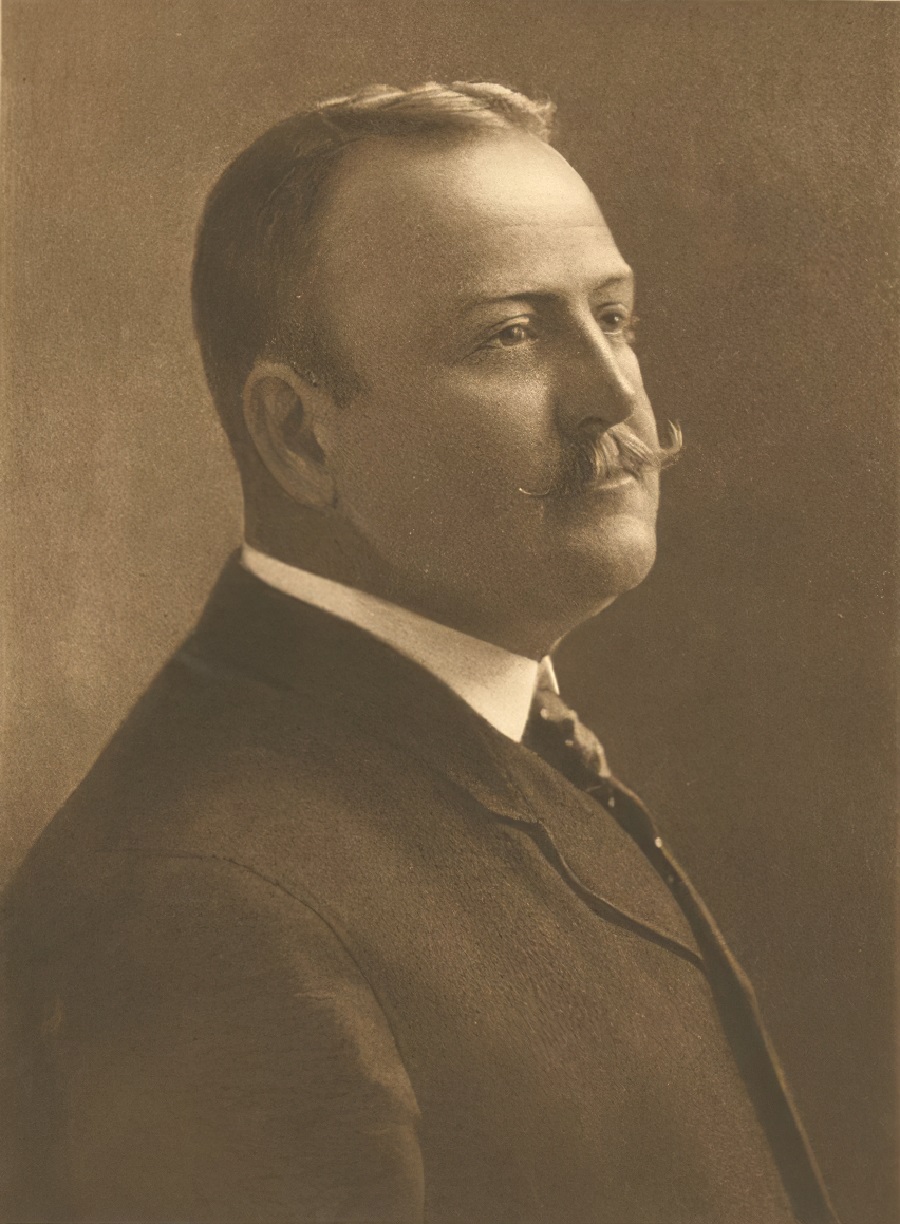
Frederic Sackrider Remington, an American artist born in 1861 in Canton, New York, is celebrated for his vivid portrayals of the American West. Specializing in painting, sculpture, and illustration, Remington captured the essence of Western life through dynamic scenes of cowboys, Native Americans, and the U.S. Cavalry, evoking a nostalgic era that was quickly vanishing by the late 19th century.
Remington's early experiences in the West, which included ventures into sheepherding and prospecting, profoundly influenced his artwork. Despite initial business failures and personal setbacks, his first-hand encounters with the rugged landscapes and frontier characters provided authentic material for his art. By the mid-1880s, Remington’s work began to gain recognition, and he quickly established himself as a significant figure in Western art, contributing illustrations to popular magazines like Harper’s Weekly.
In his later years, Remington's style evolved, displaying a notable shift towards impressionism and atmospheric mood in his "Nocturnes" series. These paintings are characterized by a dramatic use of light and shadow to convey the mystery and tension of nighttime in the West. Despite his own critical self-view, these works were highly regarded and marked a significant contribution to American art history. Remington’s art is featured in major collections, including the Metropolitan Museum of Art and the Frederic Remington Art Museum in Ogdensburg, New York, preserving his legacy as an icon of American culture.
For those interested in exploring more about Frederic Remington’s life and works, updates on exhibitions and sales can be subscribed to, keeping enthusiasts connected to new insights and offerings related to this influential artist.


Frederic Sackrider Remington, an American artist born in 1861 in Canton, New York, is celebrated for his vivid portrayals of the American West. Specializing in painting, sculpture, and illustration, Remington captured the essence of Western life through dynamic scenes of cowboys, Native Americans, and the U.S. Cavalry, evoking a nostalgic era that was quickly vanishing by the late 19th century.
Remington's early experiences in the West, which included ventures into sheepherding and prospecting, profoundly influenced his artwork. Despite initial business failures and personal setbacks, his first-hand encounters with the rugged landscapes and frontier characters provided authentic material for his art. By the mid-1880s, Remington’s work began to gain recognition, and he quickly established himself as a significant figure in Western art, contributing illustrations to popular magazines like Harper’s Weekly.
In his later years, Remington's style evolved, displaying a notable shift towards impressionism and atmospheric mood in his "Nocturnes" series. These paintings are characterized by a dramatic use of light and shadow to convey the mystery and tension of nighttime in the West. Despite his own critical self-view, these works were highly regarded and marked a significant contribution to American art history. Remington’s art is featured in major collections, including the Metropolitan Museum of Art and the Frederic Remington Art Museum in Ogdensburg, New York, preserving his legacy as an icon of American culture.
For those interested in exploring more about Frederic Remington’s life and works, updates on exhibitions and sales can be subscribed to, keeping enthusiasts connected to new insights and offerings related to this influential artist.


Frederic Sackrider Remington, an American artist born in 1861 in Canton, New York, is celebrated for his vivid portrayals of the American West. Specializing in painting, sculpture, and illustration, Remington captured the essence of Western life through dynamic scenes of cowboys, Native Americans, and the U.S. Cavalry, evoking a nostalgic era that was quickly vanishing by the late 19th century.
Remington's early experiences in the West, which included ventures into sheepherding and prospecting, profoundly influenced his artwork. Despite initial business failures and personal setbacks, his first-hand encounters with the rugged landscapes and frontier characters provided authentic material for his art. By the mid-1880s, Remington’s work began to gain recognition, and he quickly established himself as a significant figure in Western art, contributing illustrations to popular magazines like Harper’s Weekly.
In his later years, Remington's style evolved, displaying a notable shift towards impressionism and atmospheric mood in his "Nocturnes" series. These paintings are characterized by a dramatic use of light and shadow to convey the mystery and tension of nighttime in the West. Despite his own critical self-view, these works were highly regarded and marked a significant contribution to American art history. Remington’s art is featured in major collections, including the Metropolitan Museum of Art and the Frederic Remington Art Museum in Ogdensburg, New York, preserving his legacy as an icon of American culture.
For those interested in exploring more about Frederic Remington’s life and works, updates on exhibitions and sales can be subscribed to, keeping enthusiasts connected to new insights and offerings related to this influential artist.


Frederic Sackrider Remington, an American artist born in 1861 in Canton, New York, is celebrated for his vivid portrayals of the American West. Specializing in painting, sculpture, and illustration, Remington captured the essence of Western life through dynamic scenes of cowboys, Native Americans, and the U.S. Cavalry, evoking a nostalgic era that was quickly vanishing by the late 19th century.
Remington's early experiences in the West, which included ventures into sheepherding and prospecting, profoundly influenced his artwork. Despite initial business failures and personal setbacks, his first-hand encounters with the rugged landscapes and frontier characters provided authentic material for his art. By the mid-1880s, Remington’s work began to gain recognition, and he quickly established himself as a significant figure in Western art, contributing illustrations to popular magazines like Harper’s Weekly.
In his later years, Remington's style evolved, displaying a notable shift towards impressionism and atmospheric mood in his "Nocturnes" series. These paintings are characterized by a dramatic use of light and shadow to convey the mystery and tension of nighttime in the West. Despite his own critical self-view, these works were highly regarded and marked a significant contribution to American art history. Remington’s art is featured in major collections, including the Metropolitan Museum of Art and the Frederic Remington Art Museum in Ogdensburg, New York, preserving his legacy as an icon of American culture.
For those interested in exploring more about Frederic Remington’s life and works, updates on exhibitions and sales can be subscribed to, keeping enthusiasts connected to new insights and offerings related to this influential artist.


Frederic Sackrider Remington, an American artist born in 1861 in Canton, New York, is celebrated for his vivid portrayals of the American West. Specializing in painting, sculpture, and illustration, Remington captured the essence of Western life through dynamic scenes of cowboys, Native Americans, and the U.S. Cavalry, evoking a nostalgic era that was quickly vanishing by the late 19th century.
Remington's early experiences in the West, which included ventures into sheepherding and prospecting, profoundly influenced his artwork. Despite initial business failures and personal setbacks, his first-hand encounters with the rugged landscapes and frontier characters provided authentic material for his art. By the mid-1880s, Remington’s work began to gain recognition, and he quickly established himself as a significant figure in Western art, contributing illustrations to popular magazines like Harper’s Weekly.
In his later years, Remington's style evolved, displaying a notable shift towards impressionism and atmospheric mood in his "Nocturnes" series. These paintings are characterized by a dramatic use of light and shadow to convey the mystery and tension of nighttime in the West. Despite his own critical self-view, these works were highly regarded and marked a significant contribution to American art history. Remington’s art is featured in major collections, including the Metropolitan Museum of Art and the Frederic Remington Art Museum in Ogdensburg, New York, preserving his legacy as an icon of American culture.
For those interested in exploring more about Frederic Remington’s life and works, updates on exhibitions and sales can be subscribed to, keeping enthusiasts connected to new insights and offerings related to this influential artist.


Frederic Sackrider Remington, an American artist born in 1861 in Canton, New York, is celebrated for his vivid portrayals of the American West. Specializing in painting, sculpture, and illustration, Remington captured the essence of Western life through dynamic scenes of cowboys, Native Americans, and the U.S. Cavalry, evoking a nostalgic era that was quickly vanishing by the late 19th century.
Remington's early experiences in the West, which included ventures into sheepherding and prospecting, profoundly influenced his artwork. Despite initial business failures and personal setbacks, his first-hand encounters with the rugged landscapes and frontier characters provided authentic material for his art. By the mid-1880s, Remington’s work began to gain recognition, and he quickly established himself as a significant figure in Western art, contributing illustrations to popular magazines like Harper’s Weekly.
In his later years, Remington's style evolved, displaying a notable shift towards impressionism and atmospheric mood in his "Nocturnes" series. These paintings are characterized by a dramatic use of light and shadow to convey the mystery and tension of nighttime in the West. Despite his own critical self-view, these works were highly regarded and marked a significant contribution to American art history. Remington’s art is featured in major collections, including the Metropolitan Museum of Art and the Frederic Remington Art Museum in Ogdensburg, New York, preserving his legacy as an icon of American culture.
For those interested in exploring more about Frederic Remington’s life and works, updates on exhibitions and sales can be subscribed to, keeping enthusiasts connected to new insights and offerings related to this influential artist.
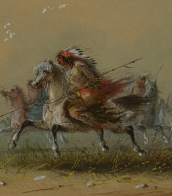

Frederic Sackrider Remington, an American artist born in 1861 in Canton, New York, is celebrated for his vivid portrayals of the American West. Specializing in painting, sculpture, and illustration, Remington captured the essence of Western life through dynamic scenes of cowboys, Native Americans, and the U.S. Cavalry, evoking a nostalgic era that was quickly vanishing by the late 19th century.
Remington's early experiences in the West, which included ventures into sheepherding and prospecting, profoundly influenced his artwork. Despite initial business failures and personal setbacks, his first-hand encounters with the rugged landscapes and frontier characters provided authentic material for his art. By the mid-1880s, Remington’s work began to gain recognition, and he quickly established himself as a significant figure in Western art, contributing illustrations to popular magazines like Harper’s Weekly.
In his later years, Remington's style evolved, displaying a notable shift towards impressionism and atmospheric mood in his "Nocturnes" series. These paintings are characterized by a dramatic use of light and shadow to convey the mystery and tension of nighttime in the West. Despite his own critical self-view, these works were highly regarded and marked a significant contribution to American art history. Remington’s art is featured in major collections, including the Metropolitan Museum of Art and the Frederic Remington Art Museum in Ogdensburg, New York, preserving his legacy as an icon of American culture.
For those interested in exploring more about Frederic Remington’s life and works, updates on exhibitions and sales can be subscribed to, keeping enthusiasts connected to new insights and offerings related to this influential artist.


Frederic Sackrider Remington, an American artist born in 1861 in Canton, New York, is celebrated for his vivid portrayals of the American West. Specializing in painting, sculpture, and illustration, Remington captured the essence of Western life through dynamic scenes of cowboys, Native Americans, and the U.S. Cavalry, evoking a nostalgic era that was quickly vanishing by the late 19th century.
Remington's early experiences in the West, which included ventures into sheepherding and prospecting, profoundly influenced his artwork. Despite initial business failures and personal setbacks, his first-hand encounters with the rugged landscapes and frontier characters provided authentic material for his art. By the mid-1880s, Remington’s work began to gain recognition, and he quickly established himself as a significant figure in Western art, contributing illustrations to popular magazines like Harper’s Weekly.
In his later years, Remington's style evolved, displaying a notable shift towards impressionism and atmospheric mood in his "Nocturnes" series. These paintings are characterized by a dramatic use of light and shadow to convey the mystery and tension of nighttime in the West. Despite his own critical self-view, these works were highly regarded and marked a significant contribution to American art history. Remington’s art is featured in major collections, including the Metropolitan Museum of Art and the Frederic Remington Art Museum in Ogdensburg, New York, preserving his legacy as an icon of American culture.
For those interested in exploring more about Frederic Remington’s life and works, updates on exhibitions and sales can be subscribed to, keeping enthusiasts connected to new insights and offerings related to this influential artist.


Frederic Sackrider Remington, an American artist born in 1861 in Canton, New York, is celebrated for his vivid portrayals of the American West. Specializing in painting, sculpture, and illustration, Remington captured the essence of Western life through dynamic scenes of cowboys, Native Americans, and the U.S. Cavalry, evoking a nostalgic era that was quickly vanishing by the late 19th century.
Remington's early experiences in the West, which included ventures into sheepherding and prospecting, profoundly influenced his artwork. Despite initial business failures and personal setbacks, his first-hand encounters with the rugged landscapes and frontier characters provided authentic material for his art. By the mid-1880s, Remington’s work began to gain recognition, and he quickly established himself as a significant figure in Western art, contributing illustrations to popular magazines like Harper’s Weekly.
In his later years, Remington's style evolved, displaying a notable shift towards impressionism and atmospheric mood in his "Nocturnes" series. These paintings are characterized by a dramatic use of light and shadow to convey the mystery and tension of nighttime in the West. Despite his own critical self-view, these works were highly regarded and marked a significant contribution to American art history. Remington’s art is featured in major collections, including the Metropolitan Museum of Art and the Frederic Remington Art Museum in Ogdensburg, New York, preserving his legacy as an icon of American culture.
For those interested in exploring more about Frederic Remington’s life and works, updates on exhibitions and sales can be subscribed to, keeping enthusiasts connected to new insights and offerings related to this influential artist.


Frederic Sackrider Remington, an American artist born in 1861 in Canton, New York, is celebrated for his vivid portrayals of the American West. Specializing in painting, sculpture, and illustration, Remington captured the essence of Western life through dynamic scenes of cowboys, Native Americans, and the U.S. Cavalry, evoking a nostalgic era that was quickly vanishing by the late 19th century.
Remington's early experiences in the West, which included ventures into sheepherding and prospecting, profoundly influenced his artwork. Despite initial business failures and personal setbacks, his first-hand encounters with the rugged landscapes and frontier characters provided authentic material for his art. By the mid-1880s, Remington’s work began to gain recognition, and he quickly established himself as a significant figure in Western art, contributing illustrations to popular magazines like Harper’s Weekly.
In his later years, Remington's style evolved, displaying a notable shift towards impressionism and atmospheric mood in his "Nocturnes" series. These paintings are characterized by a dramatic use of light and shadow to convey the mystery and tension of nighttime in the West. Despite his own critical self-view, these works were highly regarded and marked a significant contribution to American art history. Remington’s art is featured in major collections, including the Metropolitan Museum of Art and the Frederic Remington Art Museum in Ogdensburg, New York, preserving his legacy as an icon of American culture.
For those interested in exploring more about Frederic Remington’s life and works, updates on exhibitions and sales can be subscribed to, keeping enthusiasts connected to new insights and offerings related to this influential artist.


Frederic Sackrider Remington, an American artist born in 1861 in Canton, New York, is celebrated for his vivid portrayals of the American West. Specializing in painting, sculpture, and illustration, Remington captured the essence of Western life through dynamic scenes of cowboys, Native Americans, and the U.S. Cavalry, evoking a nostalgic era that was quickly vanishing by the late 19th century.
Remington's early experiences in the West, which included ventures into sheepherding and prospecting, profoundly influenced his artwork. Despite initial business failures and personal setbacks, his first-hand encounters with the rugged landscapes and frontier characters provided authentic material for his art. By the mid-1880s, Remington’s work began to gain recognition, and he quickly established himself as a significant figure in Western art, contributing illustrations to popular magazines like Harper’s Weekly.
In his later years, Remington's style evolved, displaying a notable shift towards impressionism and atmospheric mood in his "Nocturnes" series. These paintings are characterized by a dramatic use of light and shadow to convey the mystery and tension of nighttime in the West. Despite his own critical self-view, these works were highly regarded and marked a significant contribution to American art history. Remington’s art is featured in major collections, including the Metropolitan Museum of Art and the Frederic Remington Art Museum in Ogdensburg, New York, preserving his legacy as an icon of American culture.
For those interested in exploring more about Frederic Remington’s life and works, updates on exhibitions and sales can be subscribed to, keeping enthusiasts connected to new insights and offerings related to this influential artist.


Frederic Sackrider Remington, an American artist born in 1861 in Canton, New York, is celebrated for his vivid portrayals of the American West. Specializing in painting, sculpture, and illustration, Remington captured the essence of Western life through dynamic scenes of cowboys, Native Americans, and the U.S. Cavalry, evoking a nostalgic era that was quickly vanishing by the late 19th century.
Remington's early experiences in the West, which included ventures into sheepherding and prospecting, profoundly influenced his artwork. Despite initial business failures and personal setbacks, his first-hand encounters with the rugged landscapes and frontier characters provided authentic material for his art. By the mid-1880s, Remington’s work began to gain recognition, and he quickly established himself as a significant figure in Western art, contributing illustrations to popular magazines like Harper’s Weekly.
In his later years, Remington's style evolved, displaying a notable shift towards impressionism and atmospheric mood in his "Nocturnes" series. These paintings are characterized by a dramatic use of light and shadow to convey the mystery and tension of nighttime in the West. Despite his own critical self-view, these works were highly regarded and marked a significant contribution to American art history. Remington’s art is featured in major collections, including the Metropolitan Museum of Art and the Frederic Remington Art Museum in Ogdensburg, New York, preserving his legacy as an icon of American culture.
For those interested in exploring more about Frederic Remington’s life and works, updates on exhibitions and sales can be subscribed to, keeping enthusiasts connected to new insights and offerings related to this influential artist.


Frederic Sackrider Remington, an American artist born in 1861 in Canton, New York, is celebrated for his vivid portrayals of the American West. Specializing in painting, sculpture, and illustration, Remington captured the essence of Western life through dynamic scenes of cowboys, Native Americans, and the U.S. Cavalry, evoking a nostalgic era that was quickly vanishing by the late 19th century.
Remington's early experiences in the West, which included ventures into sheepherding and prospecting, profoundly influenced his artwork. Despite initial business failures and personal setbacks, his first-hand encounters with the rugged landscapes and frontier characters provided authentic material for his art. By the mid-1880s, Remington’s work began to gain recognition, and he quickly established himself as a significant figure in Western art, contributing illustrations to popular magazines like Harper’s Weekly.
In his later years, Remington's style evolved, displaying a notable shift towards impressionism and atmospheric mood in his "Nocturnes" series. These paintings are characterized by a dramatic use of light and shadow to convey the mystery and tension of nighttime in the West. Despite his own critical self-view, these works were highly regarded and marked a significant contribution to American art history. Remington’s art is featured in major collections, including the Metropolitan Museum of Art and the Frederic Remington Art Museum in Ogdensburg, New York, preserving his legacy as an icon of American culture.
For those interested in exploring more about Frederic Remington’s life and works, updates on exhibitions and sales can be subscribed to, keeping enthusiasts connected to new insights and offerings related to this influential artist.


Frederic Sackrider Remington, an American artist born in 1861 in Canton, New York, is celebrated for his vivid portrayals of the American West. Specializing in painting, sculpture, and illustration, Remington captured the essence of Western life through dynamic scenes of cowboys, Native Americans, and the U.S. Cavalry, evoking a nostalgic era that was quickly vanishing by the late 19th century.
Remington's early experiences in the West, which included ventures into sheepherding and prospecting, profoundly influenced his artwork. Despite initial business failures and personal setbacks, his first-hand encounters with the rugged landscapes and frontier characters provided authentic material for his art. By the mid-1880s, Remington’s work began to gain recognition, and he quickly established himself as a significant figure in Western art, contributing illustrations to popular magazines like Harper’s Weekly.
In his later years, Remington's style evolved, displaying a notable shift towards impressionism and atmospheric mood in his "Nocturnes" series. These paintings are characterized by a dramatic use of light and shadow to convey the mystery and tension of nighttime in the West. Despite his own critical self-view, these works were highly regarded and marked a significant contribution to American art history. Remington’s art is featured in major collections, including the Metropolitan Museum of Art and the Frederic Remington Art Museum in Ogdensburg, New York, preserving his legacy as an icon of American culture.
For those interested in exploring more about Frederic Remington’s life and works, updates on exhibitions and sales can be subscribed to, keeping enthusiasts connected to new insights and offerings related to this influential artist.
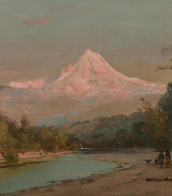

Frederic Sackrider Remington, an American artist born in 1861 in Canton, New York, is celebrated for his vivid portrayals of the American West. Specializing in painting, sculpture, and illustration, Remington captured the essence of Western life through dynamic scenes of cowboys, Native Americans, and the U.S. Cavalry, evoking a nostalgic era that was quickly vanishing by the late 19th century.
Remington's early experiences in the West, which included ventures into sheepherding and prospecting, profoundly influenced his artwork. Despite initial business failures and personal setbacks, his first-hand encounters with the rugged landscapes and frontier characters provided authentic material for his art. By the mid-1880s, Remington’s work began to gain recognition, and he quickly established himself as a significant figure in Western art, contributing illustrations to popular magazines like Harper’s Weekly.
In his later years, Remington's style evolved, displaying a notable shift towards impressionism and atmospheric mood in his "Nocturnes" series. These paintings are characterized by a dramatic use of light and shadow to convey the mystery and tension of nighttime in the West. Despite his own critical self-view, these works were highly regarded and marked a significant contribution to American art history. Remington’s art is featured in major collections, including the Metropolitan Museum of Art and the Frederic Remington Art Museum in Ogdensburg, New York, preserving his legacy as an icon of American culture.
For those interested in exploring more about Frederic Remington’s life and works, updates on exhibitions and sales can be subscribed to, keeping enthusiasts connected to new insights and offerings related to this influential artist.


Frederic Sackrider Remington, an American artist born in 1861 in Canton, New York, is celebrated for his vivid portrayals of the American West. Specializing in painting, sculpture, and illustration, Remington captured the essence of Western life through dynamic scenes of cowboys, Native Americans, and the U.S. Cavalry, evoking a nostalgic era that was quickly vanishing by the late 19th century.
Remington's early experiences in the West, which included ventures into sheepherding and prospecting, profoundly influenced his artwork. Despite initial business failures and personal setbacks, his first-hand encounters with the rugged landscapes and frontier characters provided authentic material for his art. By the mid-1880s, Remington’s work began to gain recognition, and he quickly established himself as a significant figure in Western art, contributing illustrations to popular magazines like Harper’s Weekly.
In his later years, Remington's style evolved, displaying a notable shift towards impressionism and atmospheric mood in his "Nocturnes" series. These paintings are characterized by a dramatic use of light and shadow to convey the mystery and tension of nighttime in the West. Despite his own critical self-view, these works were highly regarded and marked a significant contribution to American art history. Remington’s art is featured in major collections, including the Metropolitan Museum of Art and the Frederic Remington Art Museum in Ogdensburg, New York, preserving his legacy as an icon of American culture.
For those interested in exploring more about Frederic Remington’s life and works, updates on exhibitions and sales can be subscribed to, keeping enthusiasts connected to new insights and offerings related to this influential artist.


Frederic Sackrider Remington, an American artist born in 1861 in Canton, New York, is celebrated for his vivid portrayals of the American West. Specializing in painting, sculpture, and illustration, Remington captured the essence of Western life through dynamic scenes of cowboys, Native Americans, and the U.S. Cavalry, evoking a nostalgic era that was quickly vanishing by the late 19th century.
Remington's early experiences in the West, which included ventures into sheepherding and prospecting, profoundly influenced his artwork. Despite initial business failures and personal setbacks, his first-hand encounters with the rugged landscapes and frontier characters provided authentic material for his art. By the mid-1880s, Remington’s work began to gain recognition, and he quickly established himself as a significant figure in Western art, contributing illustrations to popular magazines like Harper’s Weekly.
In his later years, Remington's style evolved, displaying a notable shift towards impressionism and atmospheric mood in his "Nocturnes" series. These paintings are characterized by a dramatic use of light and shadow to convey the mystery and tension of nighttime in the West. Despite his own critical self-view, these works were highly regarded and marked a significant contribution to American art history. Remington’s art is featured in major collections, including the Metropolitan Museum of Art and the Frederic Remington Art Museum in Ogdensburg, New York, preserving his legacy as an icon of American culture.
For those interested in exploring more about Frederic Remington’s life and works, updates on exhibitions and sales can be subscribed to, keeping enthusiasts connected to new insights and offerings related to this influential artist.
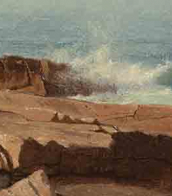

Frederic Sackrider Remington, an American artist born in 1861 in Canton, New York, is celebrated for his vivid portrayals of the American West. Specializing in painting, sculpture, and illustration, Remington captured the essence of Western life through dynamic scenes of cowboys, Native Americans, and the U.S. Cavalry, evoking a nostalgic era that was quickly vanishing by the late 19th century.
Remington's early experiences in the West, which included ventures into sheepherding and prospecting, profoundly influenced his artwork. Despite initial business failures and personal setbacks, his first-hand encounters with the rugged landscapes and frontier characters provided authentic material for his art. By the mid-1880s, Remington’s work began to gain recognition, and he quickly established himself as a significant figure in Western art, contributing illustrations to popular magazines like Harper’s Weekly.
In his later years, Remington's style evolved, displaying a notable shift towards impressionism and atmospheric mood in his "Nocturnes" series. These paintings are characterized by a dramatic use of light and shadow to convey the mystery and tension of nighttime in the West. Despite his own critical self-view, these works were highly regarded and marked a significant contribution to American art history. Remington’s art is featured in major collections, including the Metropolitan Museum of Art and the Frederic Remington Art Museum in Ogdensburg, New York, preserving his legacy as an icon of American culture.
For those interested in exploring more about Frederic Remington’s life and works, updates on exhibitions and sales can be subscribed to, keeping enthusiasts connected to new insights and offerings related to this influential artist.
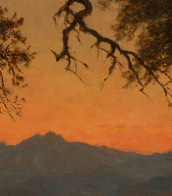

Frederic Sackrider Remington, an American artist born in 1861 in Canton, New York, is celebrated for his vivid portrayals of the American West. Specializing in painting, sculpture, and illustration, Remington captured the essence of Western life through dynamic scenes of cowboys, Native Americans, and the U.S. Cavalry, evoking a nostalgic era that was quickly vanishing by the late 19th century.
Remington's early experiences in the West, which included ventures into sheepherding and prospecting, profoundly influenced his artwork. Despite initial business failures and personal setbacks, his first-hand encounters with the rugged landscapes and frontier characters provided authentic material for his art. By the mid-1880s, Remington’s work began to gain recognition, and he quickly established himself as a significant figure in Western art, contributing illustrations to popular magazines like Harper’s Weekly.
In his later years, Remington's style evolved, displaying a notable shift towards impressionism and atmospheric mood in his "Nocturnes" series. These paintings are characterized by a dramatic use of light and shadow to convey the mystery and tension of nighttime in the West. Despite his own critical self-view, these works were highly regarded and marked a significant contribution to American art history. Remington’s art is featured in major collections, including the Metropolitan Museum of Art and the Frederic Remington Art Museum in Ogdensburg, New York, preserving his legacy as an icon of American culture.
For those interested in exploring more about Frederic Remington’s life and works, updates on exhibitions and sales can be subscribed to, keeping enthusiasts connected to new insights and offerings related to this influential artist.
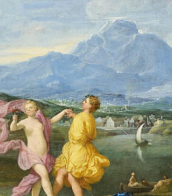

Frederic Sackrider Remington, an American artist born in 1861 in Canton, New York, is celebrated for his vivid portrayals of the American West. Specializing in painting, sculpture, and illustration, Remington captured the essence of Western life through dynamic scenes of cowboys, Native Americans, and the U.S. Cavalry, evoking a nostalgic era that was quickly vanishing by the late 19th century.
Remington's early experiences in the West, which included ventures into sheepherding and prospecting, profoundly influenced his artwork. Despite initial business failures and personal setbacks, his first-hand encounters with the rugged landscapes and frontier characters provided authentic material for his art. By the mid-1880s, Remington’s work began to gain recognition, and he quickly established himself as a significant figure in Western art, contributing illustrations to popular magazines like Harper’s Weekly.
In his later years, Remington's style evolved, displaying a notable shift towards impressionism and atmospheric mood in his "Nocturnes" series. These paintings are characterized by a dramatic use of light and shadow to convey the mystery and tension of nighttime in the West. Despite his own critical self-view, these works were highly regarded and marked a significant contribution to American art history. Remington’s art is featured in major collections, including the Metropolitan Museum of Art and the Frederic Remington Art Museum in Ogdensburg, New York, preserving his legacy as an icon of American culture.
For those interested in exploring more about Frederic Remington’s life and works, updates on exhibitions and sales can be subscribed to, keeping enthusiasts connected to new insights and offerings related to this influential artist.
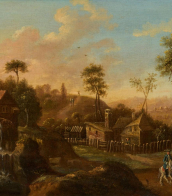

Frederic Sackrider Remington, an American artist born in 1861 in Canton, New York, is celebrated for his vivid portrayals of the American West. Specializing in painting, sculpture, and illustration, Remington captured the essence of Western life through dynamic scenes of cowboys, Native Americans, and the U.S. Cavalry, evoking a nostalgic era that was quickly vanishing by the late 19th century.
Remington's early experiences in the West, which included ventures into sheepherding and prospecting, profoundly influenced his artwork. Despite initial business failures and personal setbacks, his first-hand encounters with the rugged landscapes and frontier characters provided authentic material for his art. By the mid-1880s, Remington’s work began to gain recognition, and he quickly established himself as a significant figure in Western art, contributing illustrations to popular magazines like Harper’s Weekly.
In his later years, Remington's style evolved, displaying a notable shift towards impressionism and atmospheric mood in his "Nocturnes" series. These paintings are characterized by a dramatic use of light and shadow to convey the mystery and tension of nighttime in the West. Despite his own critical self-view, these works were highly regarded and marked a significant contribution to American art history. Remington’s art is featured in major collections, including the Metropolitan Museum of Art and the Frederic Remington Art Museum in Ogdensburg, New York, preserving his legacy as an icon of American culture.
For those interested in exploring more about Frederic Remington’s life and works, updates on exhibitions and sales can be subscribed to, keeping enthusiasts connected to new insights and offerings related to this influential artist.

